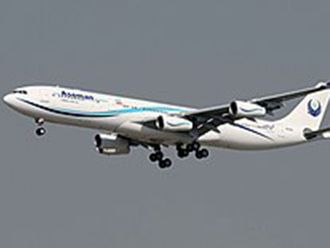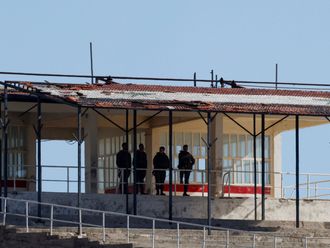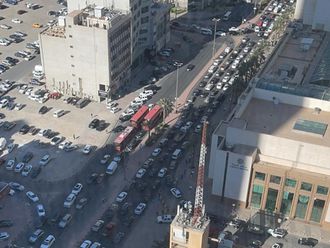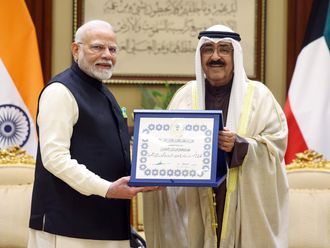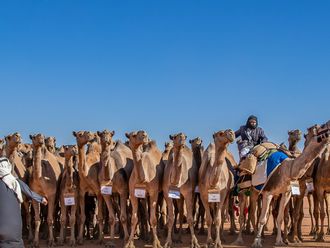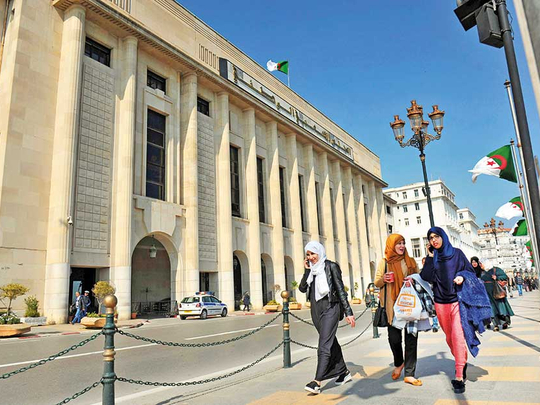
A general election was held in Algeria on May 4, and although the turnout was low — only 35 per cent of the eligible 23 million Algerians cast ballots — women now sit in 118 of the 462 seats of the People’s National Assembly. It’s a proportion of female deputies that’s unique in the democratised Arab world.
“For years, nothing was done to favour the emergence of women political leaders,” explains Nadia Ait-Zai, a professor of family law at Algiers University, describing the new law as “courageous”. Ait-Zai is an expert on women in Algerian politics and has written extensively on the subject.
“The 2012 law was a real breakthrough,” she says. “Women were always represented in parliamentary politics but they had always been on the political margins.”
In 1962, 10 women sat in the national assembly; 10 also after the 1977 elections; there were four in 1982 and 10 in 1986.
After 1989, when a new multi-party system was introduced, women were still grossly under-represented in the parliament. Only 13 women from different political parties were elected in 1997, and that figure only slightly improved after the 2002 elections when 27 women were elected. By 2007, there were 30 — accounting for just 7 per cent in the then 389-seat assembly.
The low representation rate of women, however, ended effectively in 2012 when 146 women deputies were elected — the highest number of females in Arab legislative politics and on par with western parliamentary participative systems such as in the United Kingdom, France and the United States. Now, Algeria ranks first in Arab legislative systems when compared to Tunisia, Iraq and Sudan.
“Law and political will forced political parties to use the [female-quota] mechanism put in place to increase the representation of women in politics,” says Ait-Zai. “And it is working.”
The 2012 law that promoted women’s participation in local and national politics created a female quota of between 20 and 40 per cent of the candidates’ lists — and that means over 30 per cent of the parliamentary deputies in the National Assembly are women, explains Ahmed Morsy, an Algerian expert in international relations.
Because the government wanted to push for a women quota as quickly as possible, a move called by Morsy as “positive discrimination”, the 2012 legislative assembly was mockingly dubbed the “coiffeur parliament” or the “hairstylists” Lower House by commentators and media personalities.
“This is because political parties were finding it difficult to find acceptable, professional women. [They] put forward female candidates from all walks of life, including hairstylists to run for parliament who suddenly found themselves in the forefront of parliamentary politics,” Morsy said.
This led one lawyer activist, Fatima Bin Bram, to openly say the “coiffeur parliament does not represent me or the Algerian people”. She criticised women deputies because, she claimed, “they are the result of dwindling political ethics” that is hard to justify because of their numbers in the lower chamber.
Regardless of such criticism, the number of female parliamentarians went up. In the May election, women contenders did it again, winning 118 seats and representing almost all the 63 political parties who participated in the ballot. Out of the 164 seats won by the ruling National Liberation Front, 50 are held by women. Similarly, 32 out of the 97 seats won by National Democracy for Rally — an ally of the FLN — went to women.
It’s a trend that carried through even Islamists. The largest Islamist party, the Movement for the Society of Peace, has six female deputies while Islamic Hope, Al Nahda, Justice and Building and National Republican Alliance won four seats each. The Workers Party, Algerian Popular Movement, Socialist Forces Front and the Rally for Culture and Democracy all have three female deputies each, while Al Mustaqbal Front has two women deputies. There are three women in the new parliament who won their seats as independent candidates.
Despite the impressive numbers of female deputies, Algeria remains a patriarchal society similar to other parts of the Arab world where politics is seen as a largely male domain.
One news report on the May 4 election talked about the existence of “a relatively macho culture, especially in the desert and rural heartland that left many parties short of female options as they sift[ed] through thousands of potential candidates to finalise party lists” for the election.
In Bordj Bou Arrerdj, a conservative area, election banners had blank faces of women candidates running under different parties. This created some controversy and the government forced these political parties to use women’s photos or face legal action. The parties, including progressive elements such as the Socialist Forces Front, relented but the incident demonstrates the influence still wielded by conservative elements. “This kind of encroachment is dangerous; it is not legal and it opposes all laws and traditions,” said Hassan Noui of Algeria’s election monitoring group. “It is every citizen’s right to know whom he will vote for,” he was quoted as saying by the BBC.
Fundamental issue
Before the vote, parties scrambled to find enough candidates to run on their respective electoral lists. But unlike the 2012 elections, the parties turned to journalists, teachers and other women professionals such as lawyers to run for parliament.
But there is still a fundamental issue — many women are reluctant to run for public office. FLN Secretary-General Djmal Ould Abbas said the party received 6,228 dossiers from candidates “but barely more than 100 from women”. He was speaking just two weeks before the polling day.
“Algerian political parties are also ‘macho’ — they have not invested in promoting women in politics and are disconnected [from] the evolution of Algerian society where young women are in the majority in universities, and have higher success rates in exams,” explains Nacer Djabi, a sociologist at Algiers University II.
“Certain professions have become dominated by women employees, like the press, the legal system, education, health, but all I see is that political parties have remained closed on themselves and have not followed this movement of evolution,” he added.
One party member told Ait-Zai that “parties don’t like women yet they are found everywhere.”
While women have entered parliament in droves many seem sceptical about their newly-found political power. Zalane Abderrahmane, an academic in Algeria University, describes the presence of women in parliament as mere “decorative plants”.
“Women should be there because of their ideas, capacities, their personalities, their commitment, because they are the future of Algeria,” he told Euronews.
Abderrahmane’s comments are reflective of many who say said the presence of women in the corridors of parliament has not altered the political reality.
In a study of the 2012 Algerian parliament, women made up only 22.6 per cent and 21.9 per cent of the power committees and the economic and foreign affairs committees of the National Assembly despite the fact that they formed 31.6 per cent of the parliamentary body, according to political analysts Liala Elimam and Marwa Shalaby. They noted however, that women were more concentrated — at 60 per cent — on social issues committees, leading to the clear implication that women are relegated from “high politics” influential committees to lower ones.
Despite the criticisms, there’s still a new sense of gusto. Asma Al Marwani is one the new 188 elected deputies. At 28, she is the youngest member of the parliament, representing a seat from the Al Bawaaqi Governorate in the east of Algeria. “I will fight to defend the interests of the people,” she says.
The new parliament includes Louisa Hanouni, the Secretary-General of the Workers Party. Dubbed the flame of Algerian politics, she has long been fighting for ordinary Algerians, running repeatedly for president against Abdulaziz Boutflika — the last time in 2014. She has indicated that she intends to run for president again in the next presidential elections due in 2019, when Boutflika is likely to step aside.
Now there are four women ministers in the new government headed by Abdelmadjid Tebboune, and they hold a variety of portfolios including education, post and telecommunications. Slowly but surely, women are gaining power in the nation.
Marwan Asmar is a commentator based in Amman. He has long worked in journalism and has a PhD in Political Science from Leeds University in the UK.



